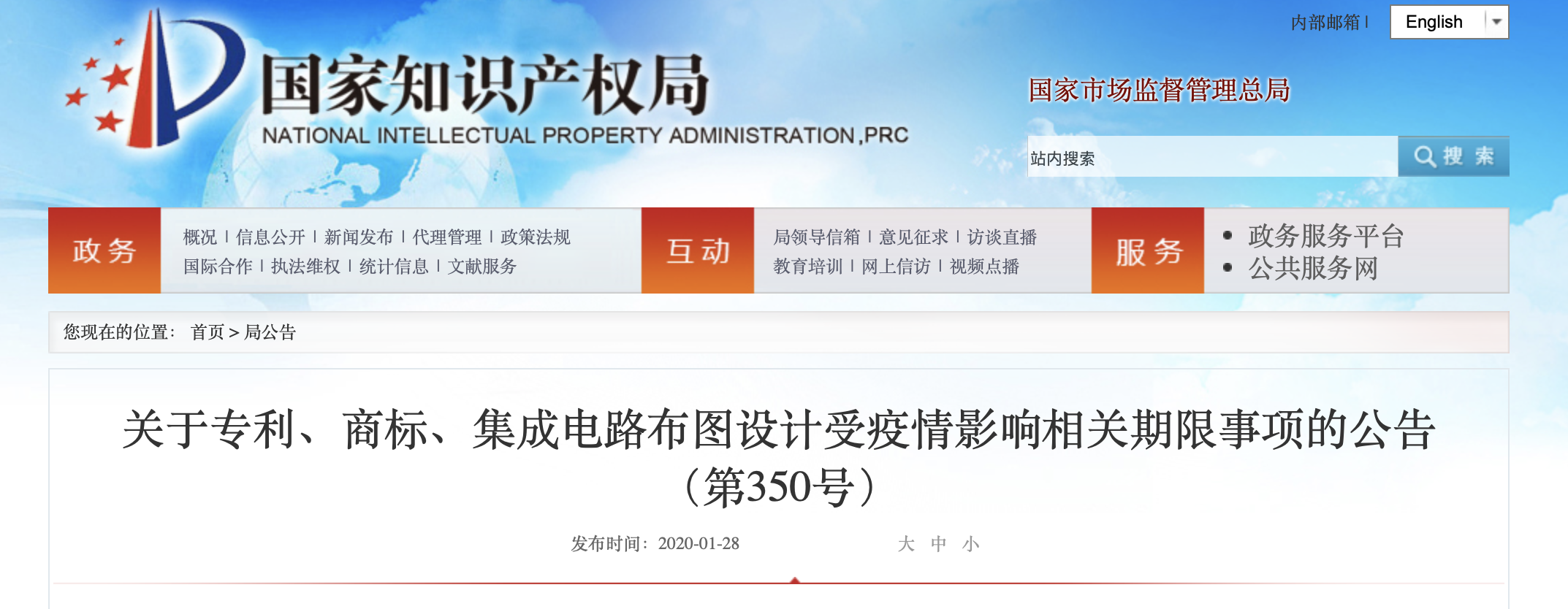

Fangben Insights
您的当前位置 : 首页>Fangben Updates>Fangben Insights

Reminders Concerning Dealing With the Affairs Related to Patent Time Limit after the 2020 Spring Festival Holiday - Interpretationof The Public Announcement of the National Intellectual Property Administration (CNIPA) No.350
Fangben Insights
发布日期:2020-02-06 14:49:10浏览次数: 854

II. Where a party fails to observe a time limit stipulated in the Patent Law or these Rules or a time limit prescribed by CNIPA due to 2019-nCoV (for example, a party failing to resumption of work on February 3, 2020), the provisions of Article 6, Item 1 of Implementing Rules of the Patent Law ("Postpone due to Force Majeure"), shall be applicable, namely,
a) One may submit a request for restoring his right within two months of the date the relevant obstacle has been eliminated;
b) The request shall be submitted along with explanatory reasons and relevant certification documents, and
c) The relevant formalities which should have been complied with before the loss of the right shall be gone through;
d) The rights restoration request fee shall not be paid;
e) The time for requesting restore his right shall not be later than two years after the expiry date.
III. As for the abovementioned "relevant certification documents" in item b), there are no specific provisions made by CNIPA. The general principle should be relevant to 2019-nCoV. In Fangben’s opinion, at least the public announcement of postponing resumption of work issued by all the local administrative authorities can serve to be the relevant certification documents. We suggest that the party concerned save such public announcements and the relevant webpage on the local government website. The announcement could be found on the websites of the provinces (municipalities directly under the central government, autonomous regions) of the people's government. Other legitimate reasons causing fail to work, such as quarantine, illness, or flight cancellations due to 2019-nCoV, may also be acceptable as relevant certification documents. We suggest that the party concerned consciously retain the relevant evidence.
IV. As shown by the current statics, not all of the provinces will postpone the resumption of work, in some provinces, the work will be resumed on February 3. As of January 31, 2020, known provinces postponing the resumption of work on February 10 include Beijing, Shanghai, Jiangsu, Zhejiang, Guangdong, Chongqing, Yunnan, Fujian, Anhui, Shandong, Jiangxi, Henan, Hebei, Heilongjiang, Guizhou, Inner Mongolia and so on. In addition, in Hubei province, the date of work resumption is February 14.
V. If the agency is located in the area where the resumption of work is to occur, but the area of applicant is not delayed, may the agency’s "force majeure" be regarded the same as the applicant's? We are looking forward to CNIPA’s further interpretation based on this special period. At least, this situation can be applied to Article 6, Item 2 of Implementing Rules of the Patent Law ("due to legitimate reasons") to request CNIPA restore the rights, but a rights restoration request fee shall be paid.
VI. It is advisable to note that, especially for those that handle foreign patent-related affairs, the provisions of the first and second paragraphs of Article 6 of Implementing Rules of the Patent Law shall not apply to the grace period for non-prejudicial disclosures, the priority period, the patent term, and the prescription for instituting legal proceedings of infringement.
The above viewpoints do not constituent a legal opinion; they only represent author’s personal understanding of relevant laws and regulations. We are open minded toward critique, if any inappropriate.
